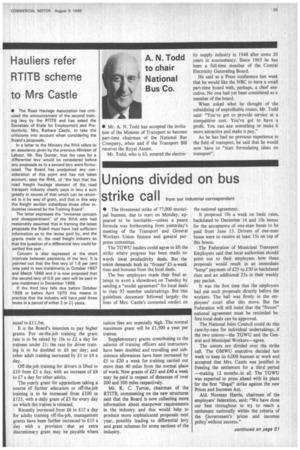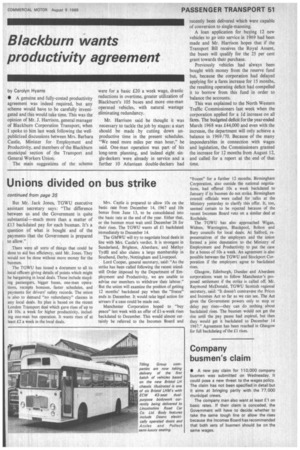Unions divided on bus
Page 37

Page 53

If you've noticed an error in this article please click here to report it so we can fix it.
Strike call from our industrial correspondent
• The threatened strike of 77,000 municipal busmen, due to start on Monday, appeared to be inevitable—unless a peace formula was forthcoming from yesterday's meeting of the Transport and General Workers Union finance and general purposes committee.
The TGWU leaders could agree to lift the strike where progress has been made towards local productivity deals. But the union demands both its "frozen" £1-a-week rises and bonuses from the local deals.
The bus employers made their final attempt to avert a showdown on Tuesday by sending a "model agreement" for local deals to their 92 member undertakings. But this guidelines document followed largely the lines of Mrs. Castle's contested verdict on the national agreement.
It proposed lOs a week on basic rates, backdated to December 14 and lOs bonus for the acceptance of one-man buses to be paid from June 13. Drivers of one-man buses were to receive at least 15s on top of this bonus.
The Federation of Municipal Transport Employers said that local authorities should point out to their employees how these proposals would result in an immediate "lumppayment of £25 to £30 in backdated rises and an additional 25s in their weekly pay packet.
It was the first time that the employers had put such proposals directly before the workers. The ball was firmly in the employees' court after this move. But the Federation will still insist that the "frozen" national agreement must be rescinded before local deals can be approved.
The National Joint Council could do this case-by-case for individual undertakings, if the two unions—the TGWU and the General and Municipal Workers—agree.
The unions are divided over the strike call. The GMWU executive decided last week to keep its 6,000 busmen at work and accepted that Mrs. Castle was justified in freezing the settlement for a third period —making 12 months,in all. The TGWU was expected to press ahead with its plans for the first "illegal" strike against the new Prices and Incomes Act.
Ald. Norman Harris, chairman of the employers' federation, said: "We have done our best throughout to try to reach a settlement nationally within the criteria of the Government's prices and incomes policy without success."
But Mr. Jack Jones, TGWU executive assistant secretary says: "The difference between us and the Government is quite substantial—much more than a matter of £13 backdated pay for each busman. It's a question of what is bought and of the payments that the Government is prepared
to allow." •
There were all sorts of things that could be done to aid bus efficiency, said Mr. Jones. They would not be done without more money for the busmen.
The TGWU has issued a document to all its local officers giving details of points which might be bargaining in local deals. These include standing passengers, bigger buses, one-man operations, receipts bonuses, faster schedules, and payments for drivers' safety records. The union is also to demand "no redundancy" clauses in any local deals. Its plan is based on the recent London Transport deal which gave rises of up to £4 10s. a week for higher productivity, including one-man bus operation. It wants rises of at least £2 a week in the local deals. Mrs. Castle is prepared to allow lOs on the basic rate from December 14, 1967 and lOs bonus from June 13, to be consolidated into the basic rate at the end of the year. Either that, or the busmen must wait until December 26 for their rises. The TGWU wants all backdated immediately to December 14.
The GMWU will try to negotiate local deals in line with Mrs. Castle's verdict. It is strongest in Sunderland, Brighton, Aberdare, and Methyr Tydfil and also claims a large membership in Southend, Derby, Nottingham and Liverpool.
Lord Cooper, general secretary, said: "As the strike has been called following the recent standstill Order imposed by the Department of Employment and Productivity, we are unable to advise our members to withdraw their labour." But the union will examine the position of getting 12 months' backdated pay when the "freeze" ends in December. It would take legal action for arrears if a case could be made out.
Manchester Corporation hoped to "buy peace" last week with an offer of £1-a-week rises backdated to December. This would almost certainly be referred to the Incomes Board and "frozen" for a further 12 months. Birmingham Corporation, also outside the national negotiations, had offered lOs a week backdated to January if its busmen do not strike. Birmingham council officials were called for talks at the Ministry yesterday to clarify this offer. It, too, seemed certain to be rejected because of the recent Incomes Board veto on a similar deal at Rochdale.
The TGWU has also approached Wigan. Widnes, Warrington, Blackpool, Bolton and Bury councils for local deals. At Salford, representatives of the employers and the union formed a joint deputation to the Ministry of Employment and Productivity to put the case for a bonus of lOs a week. An agreement is also possible between the TGWU and Stockport Corporation if the employers agree to backdated rises.
Glasgow, Edinburgh, Dundee and Aberdeen corporations want to follow Manchester's proposed settlement if the strike is called off. Mr. Raymond McDonald, TGWU Scottish regional secretary, said: "It doesn't contravene the Prices and Incomes Act so far as we can see. The Act gives the Government powers only to stop or delay pay rises—they can do nothing about backdated rises. The busmen would not get the rise until the pay pause had expired, but then they would get it backdated to December 14 1967." Agreement has been reached in Glasgow for full backdating of the El rises.
















































































































































